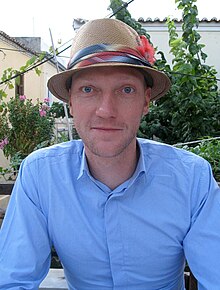Mark Champkins: Difference between revisions
Jemsta1979 (talk | contribs) No edit summary |
Jemsta1979 (talk | contribs) No edit summary |
||
| Line 7: | Line 7: | ||
Champkins studied Manufacturing Engineering (MET g.2000) at the [[University of Cambridge]], and [http://www.rca.ac.uk/Default.aspx?ContentID=507193&CategoryID=36646 Industrial Design Engineering] at the [[Royal College of Art]] (RCA g.2002) in London. |
|||
Whilst at the RCA |
Whilst at the RCA Champkins designed a range of [http://www.youtube.com/watch?v=ewrtNTMztfs Self-Heating Crockery] making use of the Phase Change Material [[Sodium Acetate Trihydrate (SAT)]]. The crockery enable users to instantaneously heat plates, cups and bowls to sixty degrees celcius by pushing a button that started a phase change reaction withing the crockery. The items could be recharged and reused by washing them in hot water or a dishwasher. |
||
In 2002 the crockery was Awarded British Invention of the Year and featured on a number of TV science programs such as [[BBC]] Television's [[Tomorrow's World]], the [[Discovery Channel]]s' |
In 2002, the crockery design was Awarded British Invention of the Year and featured on a number of TV science programs such as [[BBC]] Television's [[Tomorrow's World]], the [[Discovery Channel]]s' 'Whats the Big Idea' section, and the [[CNN News]]. |
||
After Graduating from the RCA |
After Graduating from the RCA, Champkins worked at The Helen Hamlyn Research Centre (HHRC) as part of a twelve month research project to investigate how good school design can improve standards of education in the UK. |
||
In 2004, |
In 2004, Champkins won a business Award from [[NESTA]] (National Endowment for Science Technology and the Arts) and founded [[Concentrate Design]], a company that develops products to help pupils to concentrate at school children. |
||
In 2007 |
In 2007, on the [[Dragons Den]], Champkins won investment of £100,000 from [[Peter Jones (entrepreneur)]] in return for a 40% stake in his business. |
||
== References == |
== References == |
||
Revision as of 12:43, 19 November 2009

This article includes a list of references, related reading, or external links, but its sources remain unclear because it lacks inline citations. |
Mark Champkins (born 25 April 1977), is a UK designer and inventor who gained public recognition after successfully participating in the BBC television show Dragons' Den.
Background
Champkins studied Manufacturing Engineering (MET g.2000) at the University of Cambridge, and Industrial Design Engineering at the Royal College of Art (RCA g.2002) in London.
Whilst at the RCA Champkins designed a range of Self-Heating Crockery making use of the Phase Change Material Sodium Acetate Trihydrate (SAT). The crockery enable users to instantaneously heat plates, cups and bowls to sixty degrees celcius by pushing a button that started a phase change reaction withing the crockery. The items could be recharged and reused by washing them in hot water or a dishwasher.
In 2002, the crockery design was Awarded British Invention of the Year and featured on a number of TV science programs such as BBC Television's Tomorrow's World, the Discovery Channels' 'Whats the Big Idea' section, and the CNN News.
After Graduating from the RCA, Champkins worked at The Helen Hamlyn Research Centre (HHRC) as part of a twelve month research project to investigate how good school design can improve standards of education in the UK.
In 2004, Champkins won a business Award from NESTA (National Endowment for Science Technology and the Arts) and founded Concentrate Design, a company that develops products to help pupils to concentrate at school children.
In 2007, on the Dragons Den, Champkins won investment of £100,000 from Peter Jones (entrepreneur) in return for a 40% stake in his business.
